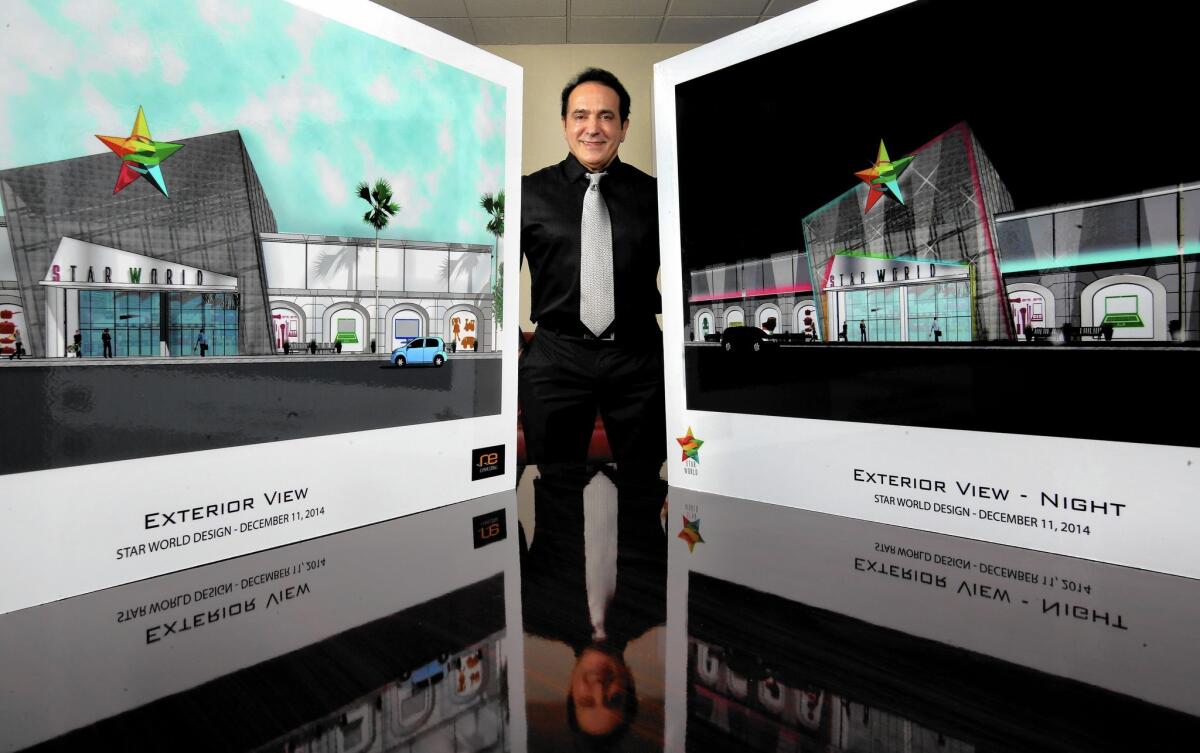How I Made It: Jerry Azarkman

- Share via
The gig: Jerry Azarkman, 61, is the founder of Curacao, a department store chain that has catered to the Latino consumer since 1976. Curacao has 11 stores in California and Arizona, annual revenue in excess of $350 million and 2,000 employees. Azarkman’s success with Curacao earned him an Ernst & Young Entrepreneur of the Year Award for Greater Los Angeles in 2014. The self-taught Azarkman jokes that “it is the only certificate I have.”
Parental guidance: His pharmacist father, Oscar, specialized in dispensing motivational lessons. “The first time I saw a plane, I asked him if I could own one,” Azarkman said. “He said: ‘You can succeed at any plan. Nothing can stand against your will.’” Mother Muluk “taught us to give without expecting anything in return,” he said.
------------
FOR THE RECORD:
Jerry Azarkman: In the Feb. 1 Business section, an article about Curacao department store founder Jerry Azarkman referred to his Israeli army service in the 1967 Six-Day War. He served in the 1973 Arab-Israeli conflict known as the Yom Kippur War.
------------
War as motivator: Born in Iran and reared in Israel, Azarkman served in the Israeli army during 1967’s Six Day War. “I did not want to face another war,” Azarkman recalled. He came to the U.S. three years later, at age 24, with $20 in his pocket.
Starting small: Azarkman’s retail career began door to door, selling small items such as electronics, appliances and video games. He decided to concentrate on what he saw as a neglected and underserved market — Latinos.
Learning fast: Speaking only Hebrew and using hand gestures, Azarkman never knew what customers meant when they kept saying “mañana, mañana” — tomorrow, tomorrow. “In a way, it made me a better salesman. I learned what it meant, and I already knew to ignore it.” His younger brother, Ron, joined the business a few years later.
The power of credit: Azarkman said he decided to place his trust in those who work hard. He still remembers that first credit customer. “I was selling a $20 item,” Azarkman recalled. “She only had $12, so I extended her credit. That is how Curacao started.”
Word of mouth: “I told my customers to tell their friends,” Azarkman said. “Would you bring your family and friends and you can be my salespersons.” Before long, Azarkman not only had loyal customers who had never been extended credit before, he had a cadre of salespeople. “Today, I tell our salesmen that same story: Give them customer service that is above expectations.”
La Curacao: The brothers opened their first La Curacao store in 1983 in L.A.’s Pico-Union district. The sprawling store included a furniture department. The bulk of the sales were on credit to Latino customers who couldn’t afford to pay cash but couldn’t get credit from traditional financial institutions. The second store didn’t open until 1995, in the Panorama City mall. The chain simplified its name in 2012 to Curacao. Today, more than 2 million customers pay through the chain’s credit card.
Rebuilding from ashes: During the 1992 riots, the Azarkmans only store was destroyed. The next morning, customers were lined up to pay their bills so that the store could keep going. “I collected catalogs from our distributors and manufacturers, opened a building across the street, and we took product orders,” Azarkman said. That was in early May 1992. “We met our May sales projections for Mother’s Day.”
Business advice: Respect and courtesy “are languages everyone understands,” Azarkman said, noting that he once first fixed a video-game customer’s television reception with a metal clothes hanger and repaired the table it was resting on, without extra charge.
Leadership style: “I lead from the front, instead of watching you do it,” Azarkman said. “I will be the example for you. I will make sure that I teach it.”
Pet peeve: “People who only know how to say ‘I’ and ‘me.’ If it’s never about ‘us’ or ‘ours,’ then there is something wrong.”
Changing course: Azarkman said his biggest fear is standing still. So last year, Azarkman handed over the Curacao reins to his brother, sold some stock and began a new retail venture called Star World Inc. Azarkman’s plan, again geared to providing goods and services to Latino consumers, is to open 360 small stores with “a faster, digital shopping experience,” along the lines of an Apple store. Azarkman said the new business will avoid the high operating costs of the “traditional big-box retail model,” which he thinks may “no longer be viable in the long term.” Azarkman remains a board member of Curacao.
Personal: Azarkman lives in Los Angeles with his wife, Patricia. They have two sons, Daniel and Eric, and a daughter, Ilanit. In his spare time, Azarkman, who got his start selling electronics, likes to collect mechanical items from the pre-electronic age such as antique cameras and typewriters.
Twitter: @RonWLATimes
More to Read
Inside the business of entertainment
The Wide Shot brings you news, analysis and insights on everything from streaming wars to production — and what it all means for the future.
You may occasionally receive promotional content from the Los Angeles Times.










